New Horizons in Environmental Politics
1 total work
- Toddi A. Steelman, University of Saskatchewan, Canada
'Those of us who work on environmental policy should never let the grind of our day-to-day challenges turn us away from the ultimate question of whether we are leaving a better environment to the next generation. Daniel Press looks at the current state of environmental regulation and probes just this question. It s worth a read for anyone who cares about the decisions we must make - and the processes we now use to get to those decisions - that will shape the world for years to come.'
- John Laird, California Secretary for Natural Resources
'In American Environmental Policy Daniel Press guides the reader through not only the motivations and concepts that have been employed to set land, water, and air pollution policies, but also a dive into the details of both the environmental science and the legal and regulatory science that determines the success or failure of these actions. This book is instrumental for all those interested in both the why and the how - and the how much - of the legacy of Rachel Carson and the past five decades of environmental management.'
- Daniel Kammen, University of California, Berkeley, US
'Daniel Press's new book is an excellent one. By focusing on implementation - what happens after policy has been adopted - Press demonstrates the weaknesses of pollution control policy in the United States. Case studies of acid rain, nonpoint source water pollution, and paper recycling illuminate 'regulatory failure,' the structural problems of American regulatory approaches. He concludes with recommendations to move us ahead, a path forward that focuses on performance, information, incentives, and source reduction. Strongly recommended.'
- Christopher McGrory Klyza, Middlebury College, US
More than 40 years after the United States launched bold efforts to curb pollution and waste, American environmental management has stalled. Drawing extensively on recent environmental science, engineering, regulatory agency data and trade information, American Environmental Policy explores how environmental management in the US has fallen short of its early promise and reputation.
Arguing that policies need to be redesigned for the 21st century, this book offers examples and principles of effective environmental policy reforms. It concludes with suggestions for how new policies should be designed, as well as examples of successful regulatory innovations already in practice around the world.
Environmental policy scholars, students and science and environment journalists interested in evaluating environmental policy over time will find this to book of value. The approaches discussed in this book will also be useful for environmental and natural resource agency officials.
